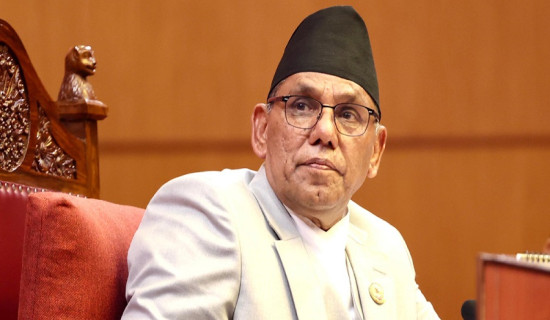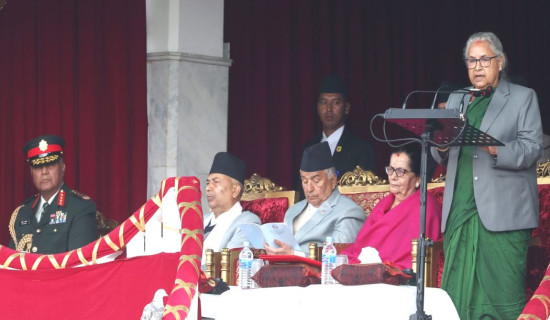- Thursday, 19 February 2026
Launching Own Digital Currency
Uttam Maharjan
Recently, three people were nabbed by the Kathmandu Valley Crime Investigation Office from Kathmandu for carrying on cryptocurrency transactions. The transactions were to the tune of Rs. 667 million. They were found involved in such transactions through various accounts opened in their own name as well as in the name of other people. The arrest of people engaged in cryptocurrency transactions has frequently featured in the news.
Cryptocurrency transactions are illegal in Nepal. On August 13, 2017, Nepal Rastra Bank (NRB) issued a notice declaring all transactions related to cryptocurrency such as bitcoin illegal. Many people have since been arrested and prosecuted. In October 2017, a police team from the Central Investigation Bureau (CIB) for the first time arrested seven people for operating bitcoin exchange business from various parts of the country.
Unclear laws
Cryptocurrency transactions are scattered across the world. But the legality of such transactions is not clear. Most countries, including Nepal, have no laws regarding cryptocurrency transactions. Under the Financial Crimes Enforcement Network (FinCen), crypto-miners are considered money transmitters and so they are subject to the laws governing such activity. Crypto-mining is banned in jurisdictions where their laws explicitly ban the mining of cryptocurrency. Apart from such jurisdictions, very few countries have banned crypto-mining.
In Israel, crypto-mining is considered a business and corporate tax is levied on cryptocurrency transactions. India is considering creating its own digital currency within this current fiscal year (April 2022 to March 2023). China has already started trials for the introduction of digital currency in various cities. In fact, China is at the forefront of introducing digital currency. The country has been using digital currency as a trial in its cities for the last two years. It is preparing for an introduction of digital currency nationwide. It is trying perhaps to surpass the US and European countries in the use of digital currency. The US and Canada are friendly to cryptocurrency.
Nepal is also considering introducing its own digital currency- central bank digital currency. NRB has made a feasibility study on the viability of its digital currency in line with the monetary policy of this fiscal year. The policy states that a feasibility study will be made for central bank digital currency in the context of ongoing worldwide studies on the usage and feasibility of digital currency.
As per NRB, no haste will be made to introduce digital currency in Nepal. First, people’s reactions to India’s digital currency after it has been launched and other such currencies will be observed. NRB expects the introduction of digital currency in two or three years. The proposed central bank digital currency will be introduced after amending the NRB Act, authorising NRB to issue digital currency as well. The digital currency will be legal tender issued by NRB in a digital form. The status of the currency will be on a par with that of fiat currency and it will be exchangeable with that currency.
Cryptocurrency has been in use around the world for the last many years. However, most countries are in the early stages of developing central bank digital currency. As per the 2021 Bank for International Settlements survey of central banks around the world, 86 per cent of the central banks are actively researching potential for developing central bank digital currency, 60 per cent are experimenting with the technology related to the development of such currency and 14 per cent are engaged in pilot projects.
We are living in a tech-driven world. The whole world is drifting towards digitisation. People are attracted to digital banking and digital payment systems. People may also carry on transactions in virtual currency developed by the private sector. People are lured into investing in cryptocurrency, hyperfunds and network marketing. Carrying on transactions in such currency may be highly risky. It is not known how safe such transactions are. When people are defrauded in such transactions, what legal recourse they can have is not clear.
It is estimated that many people in Nepal are engaged in cryptocurrency transactions. They use various network connections such as virtual private networks (VPNs) to carry on cryptocurrency and allied transactions. It is difficult to track how many people are engaged in cryptocurrency transactions and what network connections they use. Having recourse to Internet Service Providers (ISPs) could be helpful in tracking some individuals involved in cryptocurrency and related transactions but it could not be a viable solution.
VPN connections
VPN connections can, for example, be used to access sites banned by the government. A case in point is the banning of porn sites by the government in 2018. However, VPN connections can be used to access porn sites. It would not be in the interests of the country to restrict digitisation in the present-day world. When investments in cryptocurrency and related transactions are banned, some people may be attracted toward them, as is happening now, for lucrative interests. As investing in cryptocurrency issued by foreign companies may not be secure, the country should have its own digital currency.
Both India and China are in the process of issuing their own digital currencies. But Nepal is considering issuing its digital currency after our neighbours have issued theirs. Until such time, people should avoid engaging in cryptocurrency transactions. Moreover, such transactions need to be strictly regulated. It may be noted that not only Nepalis but also non-Nepalis living in Nepal are subject to legal action if found guilty of buying or investing in cryptocurrency.
(Maharjan has been regularly writing on contemporary issues for this daily since 2000. uttam.maharjan1964@gmail.com)
















